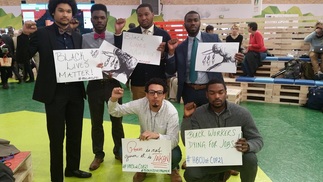|
Last year, in the Paris Agreement the world’s nations agreed at COP 21 to do their best to limit global temperature increase to 2°C above pre-industrial levels. The origins of this number can be traced back to 1992 with the signing of a treaty agreeing “to prevent dangerous interference with the earth’s climate.” Soon after, scientists began coming up with numbers close to 2°C. Eventually, this number was adopted by the European Union, the United States, and other industrialized countries in 2009 before COP 15 in Copenhagen. However, there is a lot more hiding behind the 2°C mark than meets the eye. For starters, the emissions targets laid out for each country in the Paris Agreement are not sufficient to keep the global temperature increase below 2°C. When the number 2°C was adopted in 2009 many countries (mainly African) were furious. In the words of Sudanese chair Mr. Lumumba Di-Aping, “Two degrees is a certain death for Africa.” Industrialized countries came up with 2°C because in their minds, that was preventing a “dangerous” level of climate interference. For them? Maybe. For African and small island countries? Not so much.  Black Lives Matter protesters at COP 21 in Paris http://app.greenamerica.org/climate-justice/images/hero/blm-paris-4.jpg Black Lives Matter protesters at COP 21 in Paris http://app.greenamerica.org/climate-justice/images/hero/blm-paris-4.jpg Studies have shown that a global temperature increase of 2°C would cause sub-Saharan Africa to lose 40-80% of cropland due to drought by 2040. Small island nations like the Marshall Islands would also be devastated by an increase of 2°C because of rising sea levels. Before COP 21 last year the foreign minister of the Marshall Islands stated “We cannot be expected to sign off on a small island death warrant here in Paris” in reference to the 2°C mark. The Paris Agreement contains one line about a “reach” target of 1.5°C that small island nations fought hard to include. It states as a main goal to hold “the increase in global average temperature to well below 2 degrees C above pre-industrial levels and to pursue efforts to limit the temperature increase to 1.5 degrees C above pre-industrial levels, recognizing that this would significantly reduce the risks and impacts of climate change." However, the 1.5°C mark is not legally binding, and was most likely included as a way to recognize the very real concerns of African and small island nations. Simply recognizing their concerns isn’t enough. The Paris Agreement shows that the world has agreed that any global temperature increase over 2°C is a dangerous level of interference with the climate. This is true. It is also true that 2°C will be fatal for many people in African and small island nations. What does our acceptance of the Paris Agreement say about the value we place on the lives of these people, who are mostly people of color? If we truly placed an equal value on each human being’s life, then the goal of limiting global temperature increase to 2°C is morally unacceptable. In her article “Why #BlackLivesMatter Should Transform the Climate Debate,” Naomi Klein writes, “If we refuse to speak frankly about the intersection of race and climate change, we can be sure that racism will continue to inform how the governments of industrialized countries respond to this existential crisis.” If black lives in Africa mattered, we would have agreed on a stricter goal than 2°C years ago. #BlackLivesMatter does not mean that black lives matter more than other lives. It points out the numerous examples where black lives are not valued the same as white lives and are subject to systemic racism. Decades of climate inaction finally culminating in the Paris Agreement is yet another example of this. If we look at the Paris Agreement through the lens of #BlackLivesMatter, we can see that there is a need for a fundamental shift in the way we think about international agreements for fighting climate change. By all means, we should celebrate that some sort of agreement was reached at COP 21 in Paris. However, it is equally important to recognize that it is not enough for people of color around the world.
2 Comments
Josh G.
19/11/2016 11:24:33 am
What are some of the suggestions that the African countries have that can make the Paris agreement more equal to everyone?
Reply
9/11/2022 12:40:35 am
Thank you for taking the time to share this with us
Reply
Leave a Reply. |
Categories
All
Archives
March 2024
|
 RSS Feed
RSS Feed
